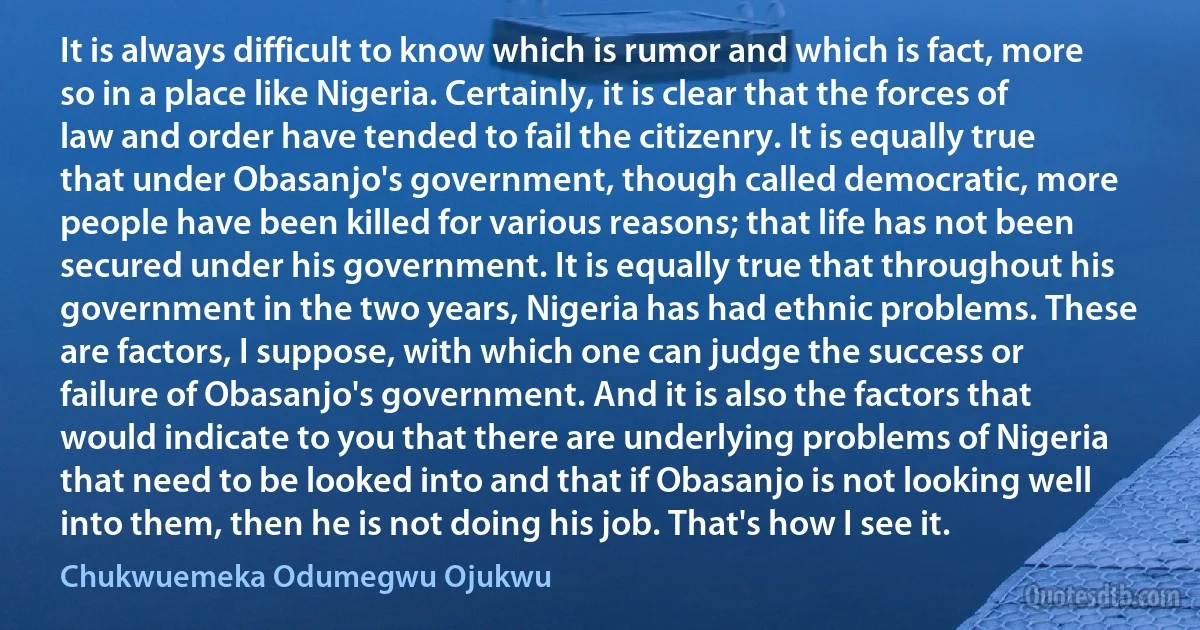
It is always difficult to know which is rumor and which is fact, more so in a place like Nigeria. Certainly, it is clear that the forces of law and order have tended to fail the citizenry. It is equally true that under Obasanjo's government, though called democratic, more people have been killed for various reasons; that life has not been secured under his government. It is equally true that throughout his government in the two years, Nigeria has had ethnic problems. These are factors, I suppose, with which one can judge the success or failure of Obasanjo's government. And it is also the factors that would indicate to you that there are underlying problems of Nigeria that need to be looked into and that if Obasanjo is not looking well into them, then he is not doing his job. That's how I see it.
Chukwuemeka Odumegwu OjukwuRelated topics
clear democratic ethnic fail failure government job judge law life looking need order people place see success suppose under well citizenry years nigeriaRelated quotes
We have entered a time of global transition marked by uniquely contradictory trends. Regional and continental associations of States are evolving ways to deepen cooperation and ease some of the contentious characteristics of sovereign and nationalistic rivalries. National boundaries are blurred by advanced communications and global commerce, and by the decisions of States to yield some sovereign prerogatives to larger, common political associations. At the same time, however, fierce new assertions of nationalism and sovereignty spring up, and the cohesion of States is threatened by brutal ethnic, religious, social, cultural or linguistic strife. Social peace is challenged on the one hand by new assertions of discrimination and exclusion and, on the other, by acts of terrorism seeking to undermine evolution and change through democratic means.

Boutros Boutros-Ghali
The chief distinction in the intellectual powers of the two sexes is shewn by man attaining to a higher eminence, in whatever he takes up, than woman can attain - whether requiring deep thought, reason, or imagination, or merely the use of the senses and hands. If two lists were made of the most eminent men and women in poetry, painting, sculpture, music, - comprising composition and performance, history, science, and philosophy, with half-a-dozen names under each subject, the two lists would not bear comparison. We may also infer, from the law of the deviation of averages, so well illustrated by Mr. Galton, in his work on 'Hereditary Genius,' that if men are capable of decided eminence over women in many subjects, the average standard of mental power in man must be above that of woman. ... Thus man has ultimately become superior to woman.

Charles Darwin
It would be some time before I fully realized that the United States sees little need for diplomacy; power is enough. Only the weak rely on diplomacy. This is why the weak are so deeply concerned with the democratic principle of the sovereign equality of states, as a means of providing some small measure of equality for that which is not equal in fact. Coming from a developing country, I was trained extensively in international law and diplomacy and mistakenly assumed that the great powers, especially the United States, also trained their representatives in diplomacy and accepted the value of it. But the Roman Empire had no need for diplomacy. Nor does the United States. Diplomacy is perceived by an imperial power as a waste of time and prestige and a sign of weakness.

Boutros Boutros-Ghali
Let us imagine that the aboriginal-original human specimen was one of two brother apes, A and B; they were alike in every respect; both were animal space-binders; but something strange happened to B; he became the first time-binder, a human. ... He had thus a new faculty, he belonged to a new dimension; but, of course, he did not realize it; and because he had this new capacity he was able to analyze his brother "A"; he observed "A is my brother; he is an animal; but he is my brother; therefore, I AM AN ANIMAL." This fatal first conclusion, reached by false analogy, by neglecting a fact, has been the chief source of human woe for half a million years and it still survives. ... He [then] said to himself, "If I am an animal there is also in me something higher, a spark of some thing supernatural."

Alfred Korzybski
For what advantage is it, that the world enjoys profound peace, if thou art at war with thyself? This then is the peace we should keep. If we have it, nothing from without will be able to harm us. And to this end the public peace contributes no little: whence it is said, ‘That we may lead a quiet and peaceable life.' But if any one is disturbed when there is quiet, he is a miserable creature. Seest thou that He speaks of this peace which I call the third (inner, ed.) kind? Therefore when he has said, ‘that we may lead a quiet and peaceable life,' he does not stop there, but adds ‘in all godliness and honesty.' But we cannot live in godliness and honesty, unless that peace be established. For when curious reasonings disturb our faith, what peace is there? or when spirits of uncleanness, what peace is there?

John Chrysostom
